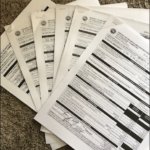 The Yellow River crested at an all-time, historic flood level of 17.61 feet in Plymouth on the evening of February 22. Communities across Marshall County are deeply affected and relief and recovery efforts are underway. Leaders from across the impacted areas are coming together in this time of crisis, organizing efforts and working diligently to aid impacted families and businesses.
The Yellow River crested at an all-time, historic flood level of 17.61 feet in Plymouth on the evening of February 22. Communities across Marshall County are deeply affected and relief and recovery efforts are underway. Leaders from across the impacted areas are coming together in this time of crisis, organizing efforts and working diligently to aid impacted families and businesses.
Marshall County Health officials urge Marshall County residents to use extreme caution while dealing with floodwaters.
“The flood of 2018 is leaving devastation behind,” said Christine Stinson, the administrator for the Marshall County Health Department. “We need to remember that floodwaters and the remains of floodwaters are dangerous to your health. Some basic precautions can help protect your health as you begin the cleanup process.”
Families and businesses impacted by the flood who need assistance and potential flood recovery volunteers are urged to call the United Way’s 2-1-1 service to report those needs and be directed to available resources — shelter, utility assistance, etc. 2-1-1 is a United Way-supported free and confidential information referral service that helps Hoosiers find the local resources they need in times of crisis. Trained responders are available to take calls and connect flood-impacted families to resources and volunteers to opportunities, 24 hours a day, 7 days a week.
Alternatively, families and businesses impacted by the flood may report their needs at bit.ly/ply-request. Individuals who wish to volunteer their time to support flood recovery efforts are urged to input their availability at bit.ly/ply-vol. These links are the same forms that will be used by 2-1-1. You may report your needs and/or availability to volunteer using either manner.
The Webster Center, at 110 Webster Avenue, Plymouth, has been set up as an emergency shelter, with cots and food for displaced families. The local Red Cross is administering this facility, and it will be open as long as the need presents itself. Shower facilities and transportation are available and accessible upon request.
121 West Garro Street, Plymouth, has been set up as the Flood Incident Command Center. The Command Center will open on Monday, February 26, at 8:00 a.m. EST.
Cash donations are best in time of disaster. Cash allows disaster response specialists, organizations and responding communities to purchase needed supplies immediately, where needed most.
Check/cash/credit card contributions may be made by contacting the United Way of Marshall County office at 574-936-3366 with checks payable to:
UWMC/2018 Flood Response
PO Box 716
2701 N Michigan St,
Plymouth, IN 46563
Checks may also be dropped off at the Flood Incident Command Center. Donations may also be made online at www.marshallcountyuw.org.
Flood safety information
- Stay out of the water! DO NOT drive through standing water.
- Flood water is highly contaminated. Floodwater is contaminated with E Coli, bacteria and viruses. If you are dealing with a flood-affected property, it is important to protect yourself during the cleanup. Make sure you are up to date on your immunizations, especially Tdap.
- If you are in contact with floodwaters, shower as soon as possible to clean away any contamination from the floodwater.
- Never drink floodwater
- Wear protective clothing, including gloves and boots, when working in areas that have been affected by floodwater.
- All hard surfaces, including children’s toys, which have been contaminated by flood water should be cleaned and properly disinfected.
- Well water: If your well has been affected by the floodwater, DO NOT use the water until you have disinfected the well and tested the well for presence of bacteria. Directions to disinfect your well can be found on the Marshall County Health Department website atwww.co.marshall.in.us or on our Marshall County Health Department Facebook Page.
- Septic systems: If your septic system is underwater now, do not panic and attempt to pump the tank. Let the system rest by limiting your water use during the flood. Once floodwaters have receded, have the septic tanks cleaned & pumped by a licensed septic pumper. Have your soil absorption field checked by a certified septic inspector to see your system has been damaged.
- Food: Do not eat foods that have come into contact with flood waters. Throw away food that cannot be kept cold or properly heated due to lack of power.
- First aid and wound care: Immediately clean all wounds with soap and clean water. If you are dealing in floodwater or are cleaning up after flood water, make sure you are current on your tetanus vaccination.
- Mold: Mold is always a concern after a flood event. Mold can begin to grow quickly after a flood. Dry the area that has been affected by the floodwater as quickly as possible. Some materials such as moldy clothing, ceiling tiles, sheet rock and carpeting may need to be removed and replaced. When in doubt, take it out!! Removal and cleaning are important because even dead mold can cause allergic reactions in some people.














